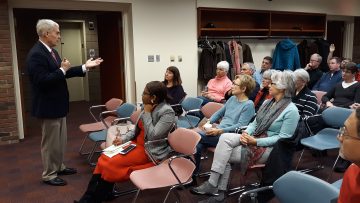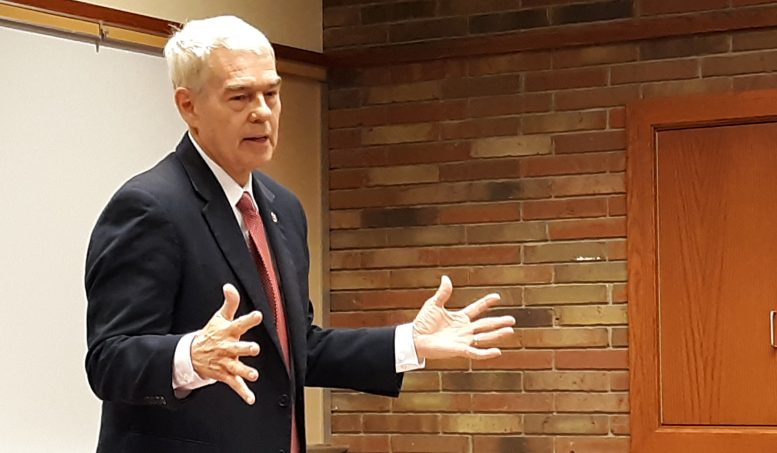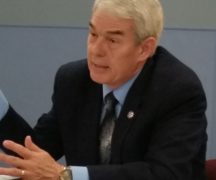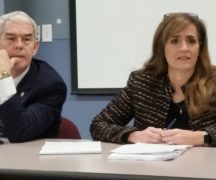By JAN LARSON McLAUGHLIN
BG Independent News
By JAN LARSON McLAUGHLIN
BG Independent News
Since the lame duck session of state government usually brings some hasty legislative decisions, State Senator Randy Gardner spent Saturday morning conferring with his constituents.
Always a history teacher at heart, Gardner tried to put the present in perspective by explaining past decisions. For two hours, he answered questions at his town hall meeting, then spent another hour talking with citizens individually.
Though they didn’t always like his answers, the citizens at Saturday’s town hall meeting appreciated the willingness of the senator to hold a public gathering.
“The next three weeks will be a really challenging time with big decisions,” said Gardner, a Republican from Bowling Green who has rotated between the state representative and senate seats since 1984.
Adding to the unpredictability of the lame duck session will be the number of amendments tacked onto bills at the last moment.
“Amendments will change the outcome of bills,” Gardner said.
And it’s not unusual for amendments to present competing interests in the same bill, he added.
Gardner has two of his own issues pending in the lame duck session. The Sierah Joughin bill creates a statewide database for law enforcement listing convicted violent offenders living in their jurisdictions. The bill is in response to the death of a 20-year-old woman from Fulton County, who was killed by a convicted violent felon.
“I’m pretty optimistic,” this will pass, Gardner said.
This bill has its critics, he said. Some feel the database could impede the rehabilitation of convicts. To better understand that criticism, Gardner said he met with Eddie Slade, who spent 31 years in prison for murder and burglary.
“I have extra respect now for people who struggle to turn the lives around,” he said. But Sierah’s Law is in the best interest of communities, he said.
Gardner’s other pending bill would “finally” see movement to get funding for the preservation of a healthy Lake Erie and help the agricultural community at the same time.

Randy Gardner addresses residents.
Following are some of the other topics Gardner was asked about during the town hall.
Hot button issues – guns, abortion and petitioning
Marilyn Bowlus, of Pemberville, asked Gardner about pending house bills on “Stand Your Ground” gun laws and abortion rights.
“It seems like Ohio is going backward,” Bowlus said. States that make it easier for people to justify firing a gun at someone often see higher levels of gun violence, she said.
“It seems like we should be trying to lessen gun violence,” Bowlus said.
Gardner said Ohio’s current laws on using a gun for defense are stricter than some other states. He also said that despite public perception, violent crimes with guns have dropped since 1993, though they have seen an uptick in the last four to five years.
At that point in the town hall, a woman interrupted Gardner and asked about the frequency of mass shootings. “We’re not going to do that,” Gardner said to the woman, asking that she wait her turn. The woman abruptly left the meeting.
“There are some things in that bill right now that I’m not for,” he said of the “stand your ground” bill. Gardner said he’s hopeful the bill can be modified before it goes up for a vote.
Gardner also pointed out that while 20 to 40 students are killed each year in school shootings, more than 4,000 die from suicide. Both issues need attention.
“I think we need to be about both,” he said.
On the abortion issue, Gardner was less willing to look for compromises.
Bowlus said the new legislation would make it much more difficult for women to access abortions in Ohio.
The majority of Americans believe in the right of women to have abortions, she said. “We’re backtracking on that in Ohio,” she said.
But Gardner sees it differently.
“I truly believe that one of our fundamental responsibilities is to protect innocent human life,” he said. And that includes unborn children. “I know that’s not what you want to hear.”
Peg Baker, of Bowling Green, asked about the goal of the legislation.
“Why do you think abortions are going to stop with this bill,” Baker asked.
“I don’t,” Gardner said.
He went a step further, and said that government must also support children who are already born.
“If we’re concerned about a 7-year-old saying the Pledge at the beginning of the day, we’d better be concerned about the rest of her day,” he said.
Joan Callecod, of Bowling Green, asked about the proposed changes to the petition process required to get issues on the Ohio ballot.
“It’s a hard bar to reach to get something on the ballot now,” Callecod said. The changes would reportedly make it even more difficult.
Gardner said he didn’t expect legislation on this issue to be hurried. “It needs far more debate,” he said. “I’d be very disappointed if there was a rush to pass that in the next three weeks.”
He did express concerns about the petition process that allows so much out-of-state money to push for ballot issues. He mentioned the State Issue 1 measure that was on the November ballot.
But Katelyn Elliott, of Bowling Green, pointed out that while the money may have been from other states, the ballot signatures were all from Ohioans.
Health, marijuana and climate issues
Nancy Scott, of rural Bowling Green, talked about her husband’s diagnosis of cancer last spring and their struggle getting COBRA coverage. Scott said she had called Congressman Bob Latta’s office, but never heard back from him.
She asked about the difficulty people with legitimate medical needs have in getting medical marijuana. The state voted more than a year ago to allow medical marijuana, yet it’s still nearly impossible to acquire in Ohio, she said.
“For people who have an issue like that (cancer), it shouldn’t be an issue,” Scott said. “I have to wonder, would we have less of a heroin issue if medical marijuana was available.”
Gardner said the delay is partially due to the fact that marijuana is still an illegal drug under federal law. However, he said he expects it to be available to the public within the year.
“It’s taken longer than it should have,” he said.
Bowling Green City Council member John Zanfardino asked about the science of global warming. With the slim likelihood of the federal government addressing the issue, he asked if Ohio legislators were willing to adopt measures to reduce the impacts.
Gardner said he has repeatedly supported alternative energy in the state. When there were attempts to end alternative energy policies in Ohio, he voted against them.
However, Gardner questioned the effectiveness of one state’s efforts.
“It’s difficult for one state to be super aggressive on the issue,” if the rest of the nation and world aren’t, he said, noting the costs associated with climate change regulations.
Funding for schools and libraries
Bob Callecod, of Bowling Green, asked about state funding for school capital improvements. He mentioned the unsuccessful efforts of Bowling Green City Schools, and asked if the state could make more funding options available for schools.
Gardner said the state has spent $12 billion for school facilities, and is unlikely to provide more than currently being shared.
Callecod blamed Bowling Green’s low ranking for state funds on the wealth of the district being “skewed” by agricultural acreage and the college student population.
Gardner agreed that the ranking for Bowling Green schools shouldn’t be so far down on the list.
“I get that,” he said. Gardner said he planned to talk with Superintendent Francis Scruci again about the issue.
“One of our tasks should be to make funding more predictable,” for school districts, Gardner said. “It’s difficult to plan.”
Despite the belief by many Ohioans that schools never see more state funding, the money for schools has actually gone up in the last six years, Gardner said.
And the belief that schools are having to go to voters for levy funding more frequently is not true, he added.
Gardner also talked about his efforts to reduce the risk for school bus accidents by working with local districts and increasing penalties for traffic violations. He said Toby Snow, transportation director for Bowling Green Schools, met with him about the frequency of drivers passing buses stopped to pick up or drop off children.
“We absolutely can do better,” Gardner said.
Michael Penrod, director of the Wood County District Public Library, asked about the possibility of previously cut funding being restored to libraries in Ohio. Penrod referred to Gardner as “our ally” on this issue.
“I try to support things I believe are priorities for constituents,” Gardner said.
Some of the cuts have been restored, but the likelihood of more being returned to libraries is slim, he said. Even with the cuts, Ohio’s per capita spending on libraries is number one in the nation, Gardner said.
Local government funding
Local county, municipal and township officials are frequently asking state legislators when they can hope to see return of the Local Government Funds siphoned off by the state.
On Saturday, Gardner brought up the topic before it could be mentioned by any local officials. He acknowledged the state’s rainy day fund is getting healthier, but he also said that some municipal and school budgets have “huge reserves.”
“Even in Wood County, the balances are significant,” he said, stating that 20 of the 25 municipalities in the county have higher balances than they did in 2010.
But Gardner also said the Local Government Fund continues to be less than in the past.
“It’s significantly lower today than it was in 2010,” he said. “It’s a little bit bigger than it was six years ago.”
Bowling Green Mayor Dick Edwards responded by saying that healthy fund balances are required by bonding authorities.
“It becomes a critical issue in our capacity to borrow,” Edwards said.
“I respect that, and I understand that,” Gardner said, noting that the state has the same requirements.
Gardner made an effort to point out it wasn’t just his party that tapped into the local money. And he said Republican governor-elect Mike DeWine has said he wants to be a stronger partner with local government.
Affecting local government coffers more than the state funding was the recession, Gardner said.
Bowling Green City Council President Mike Aspacher asked about a bill that promised to give local governments more money for infrastructure.
“Maybe we’re at the point where the state is strong enough,” Aspacher said.
Gardner said he does support funding that is earmarked for roads and bridges.
Aspacher also asked about a state shift in tax collections which centralizes the collection in Columbus and takes it out of the hands of local governments. Not only does it make accurate tax projections difficult, but it also leads to less timely dispersals to cities like Bowling Green, he said.
Gardner said he also doesn’t like the idea of local residents not being able to go to their community tax offices for information. He said he would look into the issue.
Water and the health of Lake Erie
Middleton Township Trustee Penny Getz asked where the authority lies to tap into an aquifer in the northwest corner of Ohio to supply the Toledo area with water. “We’ve got a backyard full of water,” she said.
Gardner said he believes the local citizens in that region ought to have the right to decide the fate of the aquifer.
Former Portage Township Trustee Dave Housholder questioned the seriousness of the state’s efforts to ensure the health of Lake Erie. While the Clean Water Act in 1972 helped clear the lake of contaminants, the large dairy farms (Concentrated Animal Feeding Operations – CAFOs) are now reversing those positive trends, he said.
“We went no-till, and the lake got better,” said Housholder, who is a farmer. But now CAFOs are not only contaminating the lake, but also destroying local rural roads, he said.
“CAFOs are the straw that broke the camel’s back,” Housholder said of the quantity of waste created at the farms.
And to get into clean Lake Erie water, boaters have to first travel through two miles of algae, he said.
“We all need to do the right thing. It’s our turn on watch,” Housholder said. “The streams need to be getting better.”
He suggested that rather than throwing state money at the issue, that more research be done to identify the sources of the contamination in Lake Erie.
“Let’s do the research – find out exactly where it’s coming from,” Housholder said.
Gardner, who supports the Clean Water Bond Issue which may be on the ballot in 2019, said research has been done.
“I care an awful lot about the lake,” said Gardner, whose senate district includes the longest section of Lake Erie shoreline, plus some very fertile farmland.
Imposing too many regulations may have harmful effects on farms of medium and small sizes.
Gardner agreed that more research is needed, but suggested the state shouldn’t wait to act.
“There are things that can be done right now,” he said.
Housholder asked that the state be careful in setting policy.
“You can’t let the farm bureau dictate farm policy,” he said. “We’ve got to be socially responsible, too.”





